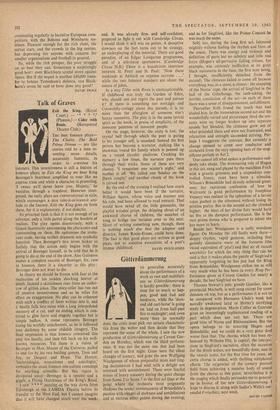Giitterdammerung
TO generalise accurately about the performance of a work as vast and multifari- ous as Gotterdiimmerung is hardly possible : there is time for so much to hap- pen, good and bad and mediocre, while the 'dam- ned old cart-horse' is going on 'and on from half-past five to midnight'; and, even mom more than he normally does, the critic must pick out certain characteris- tics from the welter and then decide that they represent the sense of the whole. I saw the new production of GOtterdiimmerung at Covent Gar- den on Monday, which was the third perform- ance. It was not the same one that had been heard on the first night. Gone were the silent changes of scenery, and gone the new Wolfgang Windgassen of whose purposeful mien and ring- ing declamation I had read with a delight not unmixed with astonishment. There were fearful noises of heavy masonry during the quiet change from Scene 2 to Scene 3 in the first act (just at the point where the orchestra most poignantly shadows the tender reminiscences of BrOnnhilde's passion with images of darkness and annihilation) and at various other points during the evening;
and as for Siegfried, like the Prince Consort he was much the same.
Solti too, during the long first act, laboured mightily without finding the rhythm and form of the music. There was energy and violence and definition of parts but no subtlety and little real force (Hagen's all-pervasive falling tritone, for example, was curiously ineffective at its great black statements in the bass, the first note being, I thought, insufficiently detached from the second). The climaxes failed to come off because everything was, in a sense, a climax : the snapping of the Norns' rope, the arrival of Siegfried in the hall of the Gibichungs, the oath-taking,' the terrible conclusion of the act—in each of these there was a sense of disappointment, unfulfilment.
Thereafter Solti found the touch that had eluded him. In the tremendous second act and the wonderfully varied and picturesque third the tex- tures were no longer broken up into separate sounds but blended, the climaxes grew out of what preceded them and were not frustrated, and relaxation and strength succeeded striving. Per- haps I exaggerate the contrast. But certainly a change seemed to come over conductor and orchestra from the very opening bars of the mag- nificent prelude to Act 2.
One cannot tell what makes a performance sud- denly take shape. The dominating role of Hagen in this act, sung and played by the matchless Frick with a granite grimness and a stupendous con- trolled frenzy, must have been a stimulus. Nilsson's Brtinnhilde had already achieved great- ness; her rapturous confession of love to Waltraute (a good performance by Josephine Veasey) was radiant in the splendour of a heroic voice pushed to the uttermost without losing its pristine purity. But in the second act she climbed higher; the blast of her divine fury would have set fire to the dampest performance. She is the rare prima donna who is prepared to admit she has more to learn.
Beside her, Windgassen is a sadly mundane figure. On Monday the old faults were there— sloppy rhythm, vapid gestures, including that genially dismissive wave of the forearm (the visual equivalent of 'pfui') and that air of vacant amiability for which the only thing that can be said is that it makes plain the puzzle of Siegfried's apparently forgetting he has just had the Ring from Briinnhilde. Windgassen strikes me as still very much what he has been in every Ring Per formance given at Covent Garden for nearly a decade, the best Siegfried we have.
Thomas Stewart's pale, greedy Gunther, like a provincial Macbeth, is well sung except for some thinness on top, but as a performance it is not to be compared with Hermann Uhde's weak but morally awakened laird or Hotter's terrifying study in degeneration. Marie Collier as Gutrune gives an interestingly sophisticated reading of a part which does not suit her. There are good trios of Norns and Rhinemaidens. But the opera belongs to its towering Hagen and Briinnhilde; and we could do a very great deal worse than that. The chorus, which has been re- hearsed by Wilhelm Pitz, is capital; the interjec- tions in Siegfried's narrative, often the occasion for the direst noises, are beautifully done, and in the vassals scene, for the first time for years, an extra chorus is added, with thrilling antiphonal effects. The exigencies of the scenery prevent Solti from achieving a massive body of sound from the chorus at this point; • nevertheless it is the staging which finally persuades me to general- ise in favour of the new Cotterdlitnmerung. hope to discuss it, along with Sadler's Wells's suc- cessful Freischiitz, next week.
DAVID CAIRNS






































 Previous page
Previous page